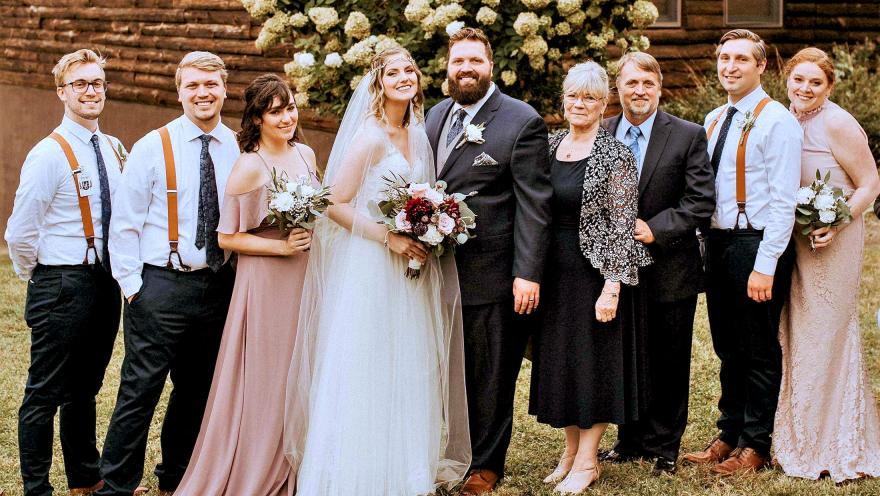By Daniel Cramer
The ALS Association recently launched a petition calling on insurers to ban the use of discriminatory value assessments that limit access to ALS drugs, which are currently being used by an industry stakeholder group commonly known as ICER to evaluate AMX0035 and oral edaravone.
Here’s why I’m signing the petition and asking you to join me.
Searching for a Silver Lining
I haven’t been part of the ALS community for long. After an 18-month long battle with doctor’s appointments, step therapies, screenings, and tests, my mom, Miss Ann as she loved to be called, was diagnosed with ALS in July 2021. The day of her diagnosis was the day I decided I needed to put my experience in policy and advocacy to work for the ALS community—and as my mom would say, take the terrible news of her diagnosis and turn it “into some good for others.”
My mom would be proud of the work I am doing now. Her life was most easily described as ‘dedication to others.’ It’s a quality I believe she passed on to all her children. Her diagnosis and our conversations showed that I needed to lend my voice to make change where I can. We called it a ‘silver lining’ of her diagnosis. In November, just a few short months after her diagnosis, my mom passed away due to complications caused by the disease that invaded our lives. She only got to see me work for the ALS Association for two weeks. My family, like many in the ALS community, would have moved mountains to find treatments to manage her ALS, to stop its awful march on her body. Her disease simply took her too quickly.
I now work in my mom’s memory, and I consider ensuring access to affordable treatments a big part of the work I do. People with ALS need the latest drugs as soon as possible and I have made it a personal goal to help make that happen. However, I have fears that the progress we make towards new therapies could be hindered by the actual process of pricing these new therapies and making them available. This process can be discriminatory and purposefully complicated.
Value is More Than a Dollar Amount
One of the primary ways insurers determine how to price a new drug is through “value assessments,” such as the one currently being conducted by the Institute for Clinical and Economic Review (ICER). The goal of these assessments is to gauge if a drug’s benefit aligns with the price set by the manufacturer. Here’s where these assessments become problematic in the case of ALS: they judge therapeutic benefit from the perspective of an “average patient with ALS.” Even in my short time being a member of this community I have seen that no two journeys with ALS are alike. I have seen there is no one-size-fits-all category for the experiences with this disease.
My mom had ALS. She was not defined by it. Her journey was not the same as another’s. People who battle this terrible disease deserve the respect to have their experiences not only heard but considered independently. The concept of value changes from person to person. My mom had her own concept of what was important.

My mom was asked when she was diagnosed, as so many are, “What is one thing you want to do with your life?” Her answer? “I want to dance at my son’s wedding.”
My brother is due to get married early next month. It would have been worth the world to my family to make my mom’s wish come true. The value she placed on being at my brother’s wedding was more than anything any methodology could capture. The ability to have meaningful moments with friends and family is what gives life its value.
The problem we face with reviews like the one ICER is conducting is that they fail to consider the value the ALS community puts on extending life by any amount so that more memories can be made.
What We Can Do to Affect Change
For me, any decision of value that doesn’t consider the importance of the moments that supply dignity in the face of this disease—from the routine, such as being able to use the restroom independently, to the meaningful, such as being able to be with family for life-affirming moments like a wedding—is not a valid discussion of “value.”
It is on us—those who have experienced this disease firsthand, those of us who are living with the disease, those who are serving as caregivers—to determine the value and quality of life with ALS. We need to stand up and object to these types of assessments that overlook the most important things that give life value. We can join together to let those in a position to deny access to promising treatments based on discriminatory “value assessments” know: “We see you, we are not okay with what you are doing, and we object.”
If you want your life, your loved one’s life to be valued on your terms, please, take a moment and sign.
Photo Credits:
Header photo: Leigh Anne Brader Photography
In-text photo: Stephanie Clark Burman, 5th and Market Photography


Comments
what a cause.
Signed the petition. Important for those affected with this devastating disease.
Xxx
Signing in honor of Chuck Kelley.
In honor of my brother who passed after 6 yes with ALS
My Mom was officially diagnosed with bulbar onset ALS in April 2018 after 18 months that included brain surgery and many other tests to rule out other issues.
During those 18 months, there were drugs she might have had access to that could have made a difference for her until she was officially diagnosed however without the “DIAGNOSIS” she was not given these prescriptions; they weren’t covered by insurance and were paid for out of pocket when she was finally allowed to take them. If it’s out of pocket, why not give these drugs to the patient? They wouldn’t have hurt her in any way and just might have helped to stave off the ghastly progression of the disease. She passed away in October 2018. So much needs to change in regard to ALS treatment protocols.
In memory of Brian Eviston
Nothing should be inaccessible to an ALS patient. Absolutely nothing! In memory of Evertt A. Beidler
Join the conversation. Please comment below.